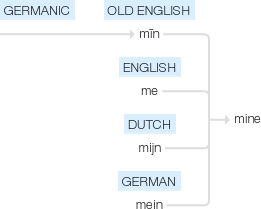Mine
Old English mīn, of Germanic origin; related to me1 and to Dutch mijn and German mein .
wiktionary
From Middle English min, myn, from Old English mīn, from Proto-Germanic *mīnaz, from Proto-Indo-European *méynos. Cognate with Saterland Frisian mien, West Frisian myn, Dutch mijn, Low German mien, German mein, Danish, Swedish and Norwegian min, Icelandic mín.
From Middle English, from Old French mine, from Late Latin mina, from Gaulish (compare to Welsh mwyn, Irish mianach(“ore”)), from Proto-Celtic *mēnis(“ore, metal”).
Borrowed from French mine.
etymonline
mine (pron.)
Old English min "mine, my," (pronoun and adjective), from Proto-Germanic *minaz (source also of Old Frisian, Old Saxon Old High German min, Middle Dutch, Dutch mijn, German mein, Old Norse minn, Gothic meins "my, mine"), from the base of me.
As an adjective, "belonging to me," preceding its noun (which may be omitted), it was superseded from 13c. by my when the noun is expressed. As a noun, "my people, my family," from Old English. In this heart of mine, no fault of mine, etc., the form is a double genitive.
mine (n.1)
"pit or tunnel made in the earth for the purpose of obtaining metals and minerals," c. 1300, from Old French mine "vein, lode; tunnel, shaft; mineral ore; mine" (for coal, tin, etc,), a word of uncertain origin, probably from a Celtic source (compare Welsh mwyn, Irish mein "ore, mine"), from Old Celtic *meini-. Italy and Greece were relatively poor in minerals, thus they did not contribute a word for this to English, but there was extensive mining from an early date in Celtic lands (Cornwall, etc.).
From c. 1400 in the military sense of "a tunnel under fortifications to overthrow them" (for further development of this sense see mine (n.2)).
mine (v.1)
c. 1300, minen, "to dig a tunnel under fortifications to overthrow them," from mine (n.1) or from Old French miner "to dig, mine; exterminate," from the French noun. From mid-14c. as "to dig in the earth" (in order to obtain minerals, treasure, etc.). Figurative meaning "ruin or destroy by slow or secret methods" is from mid-14c. Transitive sense of "to extract by mining" is from late 14c. For the sense of "to lay (explosive) mines," see mine (v.2). Related: Mined; mining.
mine (v.2)
"lay explosives," 1620s, in reference to old tactic of tunneling under enemy fortifications to blow them up; a specialized sense of mine (v.1) via a sense of "dig under foundations to undermine them" (late 14c.), and miner in this sense is attested from late 13c. Related: Mined; mining.
mine (n.2)
"explosive device," by 1866 in reference to submarine weapons (at first not distinguished from torpedoes), from mine (v.2). By 1890 as "land-mine, explosive device placed on the ground (or just under it) as a weapon."
